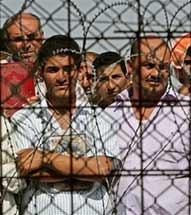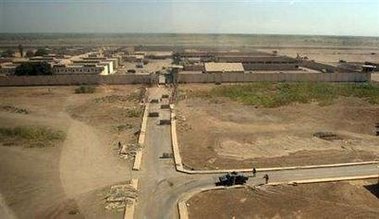Govt. Probe Reveals "Harsh, Unauthorized Interrogation Techniques" By US Special Operations...


The New York Times Eric Schmidt June 16, 2006 at 10:31 PM
READ MORE: Investigations, Afghanistan, Iraq
American Special Operations soldiers employed a set of harsh, unauthorized interrogation techniques against detainees in Iraq during a four-month period in early 2004, long after approval for their use was rescinded, according to a Pentagon inquiry released today.
The investigation is the last of 12 major inquiries to be made public in reviewing allegations of detainee abuse by American personnel in Cuba, Afghanistan and Iraq,, and it is the first to focus on Special Operations forces, who operate with more latitude than other military units. It detailed harsh treatment that continued at isolated operations bases even after the abuses first surfaced at the Abu Ghraib prison.
READ WHOLE STORY
IRAQI DETAINEE ABUSE detailed in 'blacked-out' Pentagon report.
WASHINGTON (AP) - U.S. special operations forces fed some Iraqi detainees only bread and water for up to 17 days, used unapproved interrogation practices such as sleep deprivation and loud music and stripped at least one prisoner, according to a Pentagon report on incidents dating to 2003 and 2004.
The report, with many portions blacked out, concludes that the detainees' treatment was wrong but not illegal and reflected inadequate resources and lack of oversight and proper guidance more than deliberate abuse. No military personnel were punished as a result of the investigation.
Released to the American Civil Liberties Union on Friday, the details of the report were was part of more than 1,000 pages of documents, including two major reports - one by Army Brig. Gen. Richard Formica on specials operations forces in Iraq and one by Brig. Gen. Charles Jacoby, on Afghanistan detainees.
While some of the incidents have been reported previously and reviewed by members of Congress, this was the first time the documents were released publicly. Specific names and locations, including the identities of the military units, were blacked out.
The report comes as the military is grappling with new allegations of war crimes in an increasingly unpopular conflict in Iraq. And they could hamper the Bush administration's election-year effort to turn public opinion around with upbeat reports about the progress of the new government in Baghdad.
"Both the Formica and the Jacoby report demonstrate that the government is really not taking the investigation of detainee abuse seriously," said Amrit Sing, an ACLU attorney.
Sing questioned why the two reports only focused on a limited number of incidents. In particular, she said there have been numerous documents showing that special operations forces abused detainees, and yet Formica only reviewed a few cases.
Ordered more than two years ago, the Formica review recommended changes including better training, new standards for detention centers and updated policies for detainee operations. His final report is dated November 2004 but was just released to the ACLU in its unclassified, censored form on Friday.
According to a senior defense official, all eight of Formica's recommendations for changes and improvements in detention policies were implemented shortly after he completed the report.
The official spoke on condition of anonymity because he was not authorized to speak publicly about it.
Formica reviewed allegations of abuse by special operations forces who held detainees in temporary facilities, often hastily set up near where they were captured.
Formica found that overall conditions "did not comport with the spirit of the principles set forth in the Geneva Conventions," which require humane treatment of prisoners.
Formica said, for example, that the forces used five interrogation techniques that were allowed at one point but had been rescinded by then: sleep or food deprivation, yelling and loud music, forcing detainees to remain in stressful physical positions and changing environmental conditions - which could include making their locations too hot or too cold.
Formica also found that the nakedness "was unnecessary and inconsistent with the principles of dignity and respect" in the Geneva Conventions. And he said that while one of the prisoners fed just bread and water appeared to be in good condition, 17 days of that diet "is too long."
In his recommendations he said detainees should receive adequate bedding, food, water and holding areas, get systematic medical screenings and a clear record of their detention at every level.
He dismissed other specific allegations of more serious abuse in several earlier cases. He said that the allegations of rape, sodomy and beatings were not substantiated by medical examinations and that the accusers' stories changed over time and were not credible.
The reports' release comes less than a week after three detainees committed suicide at the Guantanamo Bay detention facility in Cuba, highlighting anew accusations of abuse. A little more than two years ago, the Abu Ghraib prisoner abuse scandal in Iraq came to light, with its graphic photographs of detainees being sexually humiliated and threatened with dogs.
Another review was conducted by Jacoby, who was dispatched in May 2004 to examine the treatment of detainees at facilities in Afghanistan. His report found no evidence of abuse but identified a number of problems, including inadequate enforcement of proper interrogation practices. Link
---
On the Net:
Defense Department: http://www.defenselink.mil
THE GRAY ZONE
How a secret Pentagon program came to Abu Ghraib.
by SEYMOUR M. HERSH
=========
Mark gives more info on subject
It wasn't just about detainees who had to deal with bread and water. The report specifically cites one prisoner who died during interogation, apparently due to using hypothermia techniques on him.
In the report, Brig. Gen. Formica said that he did not investigate the underlying incidents that led to the investigation, or check the existing documentation for completeness or accuracy, relying instead on the military's own previous findings on the incidents. Those previous findings, unfortunately, appear to have been from investigations which were stonewalled, where members of the Special Forces used fake names and mysteriously "lost" the great majority of their files, and in which the Criminal Investigations (CID) officer on site stated that he was "unable to thoroughly investigate suspects and witnesses because of their involvement in the Special Access Program and/or the security classification of the unit they were assigned to during the offense."
The Special Access Program was specifically approved by Rumsfeld and his assistants in the Pentagon.
Amongst the allegations not investigated further are this one, in which a US soldier over at Abu Ghraib swore an oath indicating that a young Iraqi claimed to have been sexually and physically abused and sodomized while imprisoned by US Special Forces.
The US soldier swore an oath indicating that the Iraqi in question "could not sit and was bleeding from the rectum". This claim of sexual assault while under Special Forces imprisonment appears to have been backed up by numerous other sworn statements from US soldiers
According to the the sworn statement of one soldier:: "In my opinion, (prisoner's name redacted) came in emotionally and physically abused. (Prisoner) said, I don't remember in exact words, "they have taken everything from me."
I don't know the name of their capturing unit. All I know is they came from the palace. . . I don't know if they got a rectal investigation. . . When SF (Special Forces troops, such as Task Force 626) brought detainees in . . . you could see that they were facially abused. I don't know which SF unit. I saw detainees with bruises, black eyes, beaten, physical abuse. If we get them like that, we'll stop and take them to the aid station or MPs, that way we're cleared of it. We don't want it said that it happened here. . ."
Over the course of my time here, I've seen maybe ten detainees come in here physically abused, downright beaten and tortured, and I've easily screened hundreds of detainees. The only trend associated with that abuse would be SF (Special Forces) detainees. One of the first questions I'd ask was "why were you detained" and if they would mention (redacted) it was usually associated with extortion, and "he beat me". Those were the two trends right there."
So basically, these are very serious allegations with numerous sworn statements backing them up. It should be of real concern that the US' best troops would act in such a manner, with such impunity.




0 Comments:
Post a Comment
<< Home